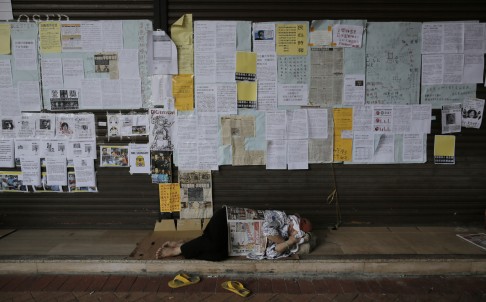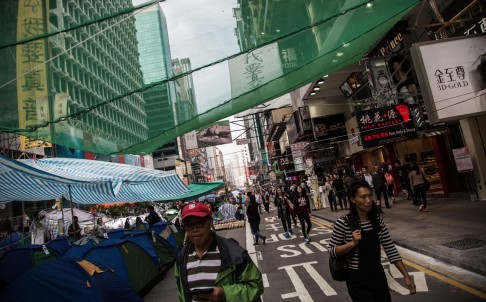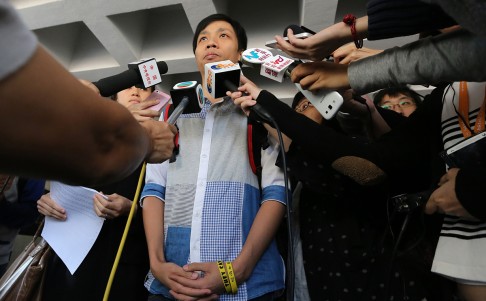Occupy Central
Occupy Central is a civil disobedience movement which began in Hong Kong on September 28, 2014. It calls on thousands of protesters to block roads and paralyse Hong Kong's financial district if the Beijing and Hong Kong governments do not agree to implement universal suffrage for the chief executive election in 2017 and the Legislative Council elections in 2020 according to "international standards." The movement was initiated by Benny Tai Yiu-ting (戴耀廷), an associate professor of law at the University of Hong Kong, in January 2013.
OCCUPY CENTRAL - DAY 50: Full coverage of the day’s events
PUBLISHED : Sunday, 16 November, 2014, 6:16am
UPDATED : Sunday, 16 November, 2014, 6:16am
Hard lessons of the Occupy protests
Philip Bowring says both officials and demonstrators ought to review not just what went wrong, or right, for them, but also what the movement tells us about Hong Kong's ills
The issue now is not just how many protesters will be arrested, but more important is whether the government and our business and bureaucratic elite have learned any lessons about the links between economic discontent and political representation. Photo: AP
As I write, it's not over yet, but there are many lessons to be learned from the Occupy protests. The most important for the main protagonists is that no amount of passion and successful tactics can substitute for lack of strategy. It was said of the 19th-century anarchist Mikhail Bakunin that he was essential for the first days of a revolution - and should then be shot. Real revolutions needed Leninist "science", not the romanticism of the anarchists.
Thus Hong Kong's peaceful umbrella "revolution" had its inspirational Joshua Wong Chi-fung, and the determination of the students encouraged tens of thousands more to join the protest movement. But it lacked one vital ingredient - an exit strategy.
Given that there was no way its declared aims could be realised other than in the much longer term, the movement needed to maximise its propaganda impact in Hong Kong and overseas. Its longevity has been impressive, but returns have been gradually diminishing as public boredom and some frustration set in. Best to have ended the protests much earlier but with a promise to return, or sustain them in a different way. Concern not to lose face by ending the demonstrations before a concrete result could be shown has proven damaging.
On the government side, concern not to lose face by making any overt concessions was equally obvious. But this seems to have proved quite a successful strategy. After a series of serious tactical errors - the tear gas, Leung Chun-ying's speech, and so on - sitting tight, avoiding confrontation but yielding nothing proved the correct response.
And if the police were to be used to clear the streets, it would be the result of private-sector initiatives sanctioned by the courts. Thus, demonstrators were confronted by a very real choice: remove themselves from the roads or submit peacefully to being arrested.
Given that the Hong Kong government has been in such disarray, with no leadership from Leung, the strategy seems to have emanated from the central government's liaison office. This was a little local difficulty which must be resolved without mayhem but without concessions. If that took time, so be it. Time was on the side of the government.
But the Beijing and government claim that the demonstrations are a threat to the rule of law was nonsense of the sort to be expected in a one-party state where the party makes and interprets the law. Civil disobedience has a long and honourable history in states ruled by law. By definition, it accepts the legal system. The protesters are not attempting to overthrow the system but draw attention to unjust laws or discrimination in voting, whether that involved women in Britain in the early 20th century, blacks in the United States or, now, the poorer classes in Hong Kong. Individuals suffer through fines and jail terms in the cause of righting legal and social wrongs.
The issues now will not just be how many protesters end up actually being arrested - turning themselves in to the police is a silly and soft option. But more important is whether the government itself and its core in the business and bureaucratic elite have learned any lessons about the links between economic discontent and political representation. Although there are some signs that the broader business community appreciates that frustrations run deep, the elite still seems to be about as obdurate and greedy as its counterpart in Thailand.
A small classic example of the bureaucratic elite's failure to learn was the recent report recommending a pay increase for top civil servants but not the rest. It should be no surprise that the panel recommending this was headed by a former senior civil servant who went on to an even more prosperous career with property developers and sits on various other government-appointed committees.
Although these senior bureaucrats enjoy perks and job security unknown in the private sector - yet do not face significant scrutiny by those outside their group despite constant mismanagement of major projects - they somehow seem to expect to be paid as much as, and enjoy a lifestyle similar to that of top private-sector executives. The idea of public service seems to have been eroded in the quest to own more houses or horses.
The same attitudes prevail in police failure to prosecute illegal limousine parking and government reluctance to enforce land and related laws in the New Territories. These failures are not the result of laziness on the part of ordinary police officers or middle-ranking civil servants. They are the direct result of decisions made by the senior ranks for reasons which they are not asked to explain - not even by the Independent Commission Against Corruption.
So perhaps another result of the "restoration of law and order" on the streets of Admiralty and Mong Kok will be a focus on unequal treatment of the majority in Hong Kong as well as the vast inequality of income. An independent judiciary is of limited use if the application of laws is unequal. So, let us all look for fairer government and the rule of law.
Universal suffrage is no cure-all but something needed to be done to try to shake this government out of lethargy and protection of vested interests. It may not have succeeded. If so, the long-term cost to society will be huge.
Philip Bowring is a Hong Kong-based journalist and commentator
This article appeared in the South China Morning Post print edition as Hard lessons of Occupy protest
Appeal court denies hearing, clearing way to end Occupy Central protests
Judges rule that protester's appeal against injunction will not be heard, allowing bailiffs to take to streets and clear Mong Kok protest site
PUBLISHED : Sunday, 16 November, 2014, 6:51am
The Occupy protest site in Mong Kok.
The Court of Appeal has refused to hear a protester's appeal against an injunction which allows police to assist bailiffs in clearing the Mong Kok protest site and arrest people who obstruct them.
High Court Chief Judge Andrew Cheung Kui-nung and Court of Appeal vice-president Mr Justice Johnson Lam Man-hon also refused Dominic Fok Wai-pong's request to stay the injunction granted by Mr Justice Thomas Au Hing-cheung on November 10.
Solicitor Maggie Chan Man-ki, representing the minibus drivers' group which was granted the injunction, said they would not take action immediately, as she needed to talk with them before placing newspaper ads to inform protesters, as required by the order.
"It all depends on the placing of the ads and the professional advice from the bailiff and the police," Chan said.
She also claimed the order included not just physical objects but also people obstructing drivers from using Nathan Road between Argyle Street and Dundas Street.
"There is a chance that if [any protester] obstructs and prevents my clients from using the road, [he or she will breach the court order]," she said.
It may take a few more days before another injunction granted to a taxi drivers' group is enforced as the wording of the order needs to be amended.
Fok said he was very disappointed by the decision, as he believed the court failed to clarify whether a public order could be dealt with by civil litigation.
"If a group of people applied for a march in the main roads of the city and obtained the approval of the police, but another group complained the march would affect their livelihoods, will the court grant an injunction to stop the march?" Fok asked.
He said he did not have much chance of taking his case further, but he would remain at the protest site and would not obstruct the bailiffs' work.
Fok's lawyer had argued that the two drivers' groups had failed to show they had suffered substantial damage in seeking the injunction. The two appeal court judges found the lower court was correct in ruling that the blocking of the road would cause professional drivers to suffer.
"Indeed for those who earn a living or derive an income from the provision of public transport services in Hong Kong, a densely populated city with heavy traffic and serious road congestion even in normal times, their loss in earnings or income by reason of the road blockages in an area as busy and as central as Mong Kok is, in our view, almost a matter of common sense, quite apart from the evidence submitted [by the defence side]," their judgment said.
They also found that Fok, and by extension other protesters, had no right to occupy and block the roads. They reaffirmed that "everyone should obey a court order". The two judges agreed with the original decision authorising police to assist bailiffs in carrying out the court order.
Police Commissioner Andy Tsang Wai-hung yesterday called on protesters not to obstruct the enforcement of injunctions aimed at clearing occupied zones in Mong Kok and Admiralty.
"[The protests] cannot be allowed to go on," said Tsang. "These protests have blockaded roads, severely disrupted the order of society and undermined the rule of law in Hong Kong."
This article appeared in the South China Morning Post print edition as Appeal court clears way to end occupation
Hong Konger Lavina : I need your help
Lavina, a high school girl from Hong Kong, calls for your attention to her home..... "I am not alone. With you, we are not alone."
相關新聞:堅持做對的事 女學生留守旺角3週 (http://goo.gl/HdrvXw)
相關新聞:堅持做對的事 女學生留守旺角3週 (http://goo.gl/HdrvXw)




沒有留言:
張貼留言